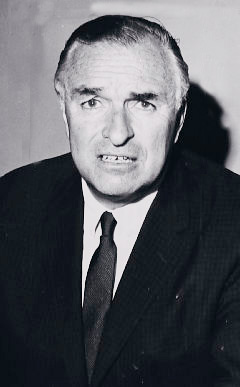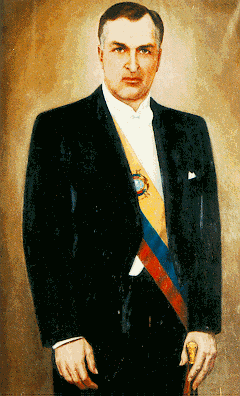<Back to Index>
- Astronomer Tobias Mayer, 1723
- Architect Georg Wenzeslaus von Knobelsdorff, 1699
- President of Ecuador Galo Plaza Lasso, 1906
PAGE SPONSOR


Galo Plaza Lasso (February 17, 1906 – January 28, 1987) was an Ecuadorian politician and statesman who served as the Ecuadorian Ambassador to the U.S., President of Ecuador from 1948 to 1952, and Secretary General of the Organization of American States from 1968 to 1975. He is the son of former Ecuadorian President Leonidas Plaza.
Plaza was born in New York City in 1906 at the Marlton House during the exile of his father, the general and ex-president Leónidas Plaza; his mother was Avelina Lasso Ascásubi. He studied agriculture at the University of Maryland, economics at the University of California, Berkeley, and diplomacy at the Edmund A. Walsh School of Foreign Service at Georgetown University.
In 1938, Plaza was appointed the Minister of War of Ecuador. In 1944, he was appointed as Ecuador's Ambassador to the U.S. In 1948, after forming a liberal political group in Ecuador, he was elected President of Ecuador.
Galo Plaza differed from previous Ecuadorian presidents. The son of former President Leónidas Plaza, he had been born in the United States, where he also attended several universities. His ties to the United States grew even closer as a result of serving there as ambassador under President Arroyo del Río. These links, as Pike points out, "rendered him vulnerable to charges by Velasco Ibarra and other demagogic opponents of being the lackey of U.S. imperialism." Galo Plaza was not a professional politician, but a gentleman farmer with a sizable cattle ranch near Quito, where he customarily spent weekends throughout his four years as president.
Galo Plaza brought a developmentalist and technocratic emphasis to Ecuadorian government. He invited a wide variety of foreign experts in economic development and in governmental administration to recommend and catalog reforms in both areas. In large part because of a lack of political will within either the executive or the legislature, however, virtually none of the recommended reforms was enacted. Nevertheless, the economy experienced a marked improvement, with inflation finally slowing down and both government budget and foreign currency accounts balancing for the first time in many years. This achievement was even more remarkable in light of the series of major earthquakes, landslides, and floods suffered by Ecuador in 1949 and 1950.
No doubt Galo Plaza's most important contribution to Ecuadorian political culture was his commitment to the principles and practices of democracy. Galo Plaza endorsed such democratic guarantees as freedom of the press and the freedom of opponents to voice their opinions, to assemble for political purposes without fear of being jailed or worse, and to be elected to the legislature without fear of being defrauded or arbitrarily dismissed. Galo Plaza was able to create a mystique around the idea of his completing his term in office, something no president had accomplished since 1924, and this mystique no doubt helped him achieve his goal.
As
Galo Plaza readily admitted, however, his greatest asset, both
politically and economically, was the onset of the nation's banana
boom, as diseases plaguing plantations in Central America turned
Ecuador into an alternative supplier to the huge United States market.
Ecuador's banana exports grew from US$2 million to US$20 million
between 1948 and 1952. During these years, Ecuador also benefited from
sizable price increases — generated by the Korean War — for its
commodity
exports. As
president he managed to foment the agricultural exports of Ecuador
during his government, creating economic stability.
During his presidency, an earthquake near Ambato severely damaged the city and surrounding areas and killed approximately 8,000 people. Unable to succeed himself, he left his office in 1952 as the first president in 28 years to complete his term in office.
After leaving office, he held a number of diplomatic posts for the United Nations. He was a mediator in the conflicts in Lebanon (1958), the Congo (1960) and Cyprus (1964 - 1965). In 1968, he became the Secretary General of the OAS, where he gained a reputation for leadership.
In 1940, he founded the Colegio Americano de Quito.
Galo Plaza died of a heart attack January 28, 1987 in a hospital in Quito. He was survived by his wife, Rosario Pallares, and his five daughters and one son.